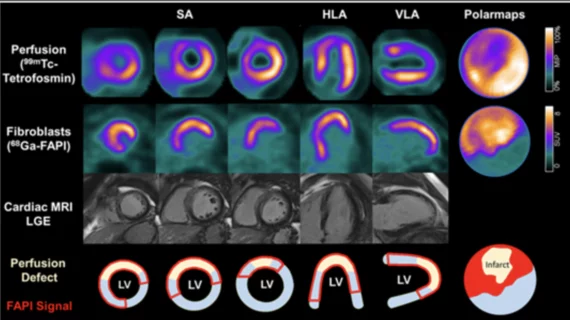‘Image of the Year’ highlights the predictive power of a new PET imaging agent
The Society of Nuclear Medicine and Molecular Imaging (SNMMI) has chosen its 2022 Image of the Year, and it’s one that is sure to interest anyone in the field of cardiac imaging.
The chosen image, selected from a field of more than 1,000 abstracts, gives a detailed look at a new PET imaging agent, 68Ga-FAPI-46. Researchers found that this agent, when correlated with cardiac MR images, offers a new perspective of what happens to a patient’s heart following an acute myocardial infarction (AMI).
“Molecular PET imaging of the fibroblast activation protein (FAP) has recently been evaluated in patients after AMI,” first author Johanna Diekmann, MD, a clinician scientist from the Hannover School of Medicine in Hannover, Germany, said in a prepared statement. “In our study, we sought to obtain further insights by correlating FAP-targeted PET imaging with tissue characteristics from cardiac MRI, as well as functional outcome.”
Diekmann et al. examined data from 35 patients who underwent 68Ga-FAPI-46 PET/CT, perfusion SPECT and cardiac MRI examinations within 11 days of an AMI. Overall, the group found that high levels of myocardial FAP upregulation were associated with left ventricular dysfunction.
“Myocardial infarction is an important contributor to the development of heart failure, but the early molecular processes involved in the transition from initial injury to heart failure are under-treated,” Diekmann said in the same statement.
“FAPI is a very exciting radiotracer that holds great potential for the future of nuclear medicine and molecular imaging,” added SNMMI Scientific Program chair Heather Jacene, MD. “As shown in the Image of the Year, 68Ga-FAPI-46 PET/CT clearly indicates pro-fibrotic activity after acute myocardial infarction. The predictive value of FAPI-PET for the magnitude of subsequent decline in global cardiac function, if further validated, may be used in the future to help select the most suitable patients for anti-fibrotic therapies which are currently under development. This could ultimately have a powerful impact on cardiovascular medicine.”
This is the SNMMI abstract associated with the chosen image:
Abstract 413. “Predicting Remodeling and Outcome from Molecular Imaging of Fibroblast Activation in Patients after Acute Myocardial Infarction,” Johanna Diekmann, James Thackeray, Thorsten Derlin, Christoph Czerner, Tobias Ross, and Frank Bengel, Department of Nuclear Medicine, Hannover Medical School, Hannover, Niedersachsen, Germany; and Tobias Koenig, Jonas Neuser, Andreas Schaefer, Jochen Tillmans, and Johann Bauersachs, Department of Cardiology and Angiology, Hannover School of Medicine, Hannover, Niedersachsen, Germany.
The 2022 SNMMI Image of the Year was announced during the group’s annual meeting, SNMMI 2022. Additional information about that conference is available here.
Related Cardiac Imaging Content:
VIDEO: Cardiac CT training requirements for radiologists and technologists
VIDEO: The new role of cardiac CT in chest pain evaluation
Key interventional cardiology takeaways from the SCAI 2022 conference

